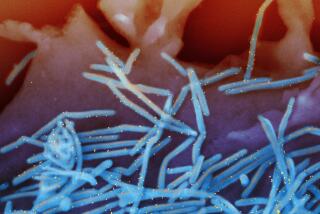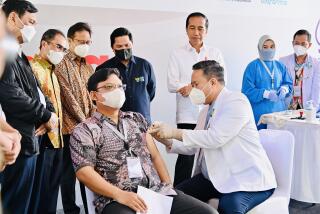First Human Vaccine Produced by Genetic Engineering OKd by FDA
- Share via
WASHINGTON — The Food and Drug Administration on Wednesday announced its approval of the first human vaccine produced by genetic engineering, which will be used to protect against Hepatitis B.
“This vaccine opens up a whole new era of vaccine production,” FDA Commissioner Frank E. Young said at a press conference. “These techniques should be able to be extended to any virus or parasite to produce other vaccines that normally cannot be propagated in the laboratory.”
Until now, vaccines have been made from viruses that have either been killed or weakened.
Young said the recombinant DNA, or gene-splicing, technology could be applied to many diseases for which there are now no preventive vaccines, such as AIDS or malaria. “The same principles could be tried with an AIDS-related virus, or with the parasite that causes malaria,” he said.
Tell Expectations
Federal health officials said they expect the new vaccine to be more widely accepted than the existing Hepatitis B vaccine, which uses plasma obtained from infected individuals, many of whom are members of groups also at high risk for AIDS.
Fewer than 30% of those at risk for Hepatitis B--including male homosexuals, intravenous drug users, dental and medical workers, immigrants from countries where Hepatitis B is prevalent, and pregnant women in high-risk groups--have been vaccinated using the older vaccine, Young said.
This low use may result, in part, from “unwarranted fears” of contracting AIDS through the vaccine, he said.
“There is no doubt that the plasma-derived vaccine is safe and its processing kills the virus that causes AIDS, but the new lab-made vaccine should further reassure those groups that they can be safely vaccinated,” Young said.
Chronic Carriers
About 200,000 new cases of Hepatitis B are reported each year in the United States and an estimated 200 million cases occur worldwide. As many as 10% become chronic carriers of the infection and are at risk of developing liver disease that can lead to cirrhosis and cancer.
The virus--considered much more contagious than the AIDS virus--is spread through contact with body fluids and intravenous drug use and can be transmitted to family members and close contacts. About 4,000 Americans die each year from cirrhosis, while 900 die from liver cancer related to Hepatitis B. Severe Hepatitis B infection kills about 250 Americans annually.
“I strongly urge high-risk individuals to take advantage of this life-saving protection,” Young said. He recommended that anyone traveling to regions of the world where Hepatitis B is endemic--such as China, Southeast Asia, sub-Saharan Africa, most Pacific Islands and the Amazon Basin--be vaccinated.
Young said the new vaccine was studied on more than 3,800 people and that “more than 90% of healthy persons who received a three-dose regimen developed protective antibodies.” The vaccine also proved 90% effective in two studies of infants born to chronically infected mothers, he said.
UC Contributed
The vaccine, developed by scientists at the University of California, San Francisco, the University of Washington and Chiron Corp. of Emeryville, Calif., results from combining brewers’ yeast cells with the gene of the outer coat of the Hepatitis B virus.
The yeast cells become “factories,” producing large quantities of the antigen portion of the virus--the part that triggers the human body to manufacture protective antibodies against future assault by the disease. While the antigen stimulates immunity, it is not itself infectious.
The vaccine, called Recombivax HB, will be manufactured by Merck Sharp & Dohme, which also produces the plasma-derived vaccine.
The vaccine is the fifth major genetically engineered product to be approved for human use, and the third this year.
David B. Lippman, an analyst with Drexel Burnham in New York, called the new vaccine “a significant scientific breakthrough” but said it will probably not have a dramatic effect on Merck’s sales and earnings. “A lot of the people who want to use it are already using (Merck’s) old vaccine,” he said.
$45 Million in Sales
The plasma-derived vaccine has annual sales of about $45 million, Lippman said.
However, Edward E. Penhoet, president of Chiron Corp., indicated that the new vaccine may be more profitable for Merck because biotechnology makes it “theoretically cheaper to produce” a genetically engineered vaccine, as opposed to one derived from human blood.
Penhoet said approval of the new vaccine “brings us a lot closer to the day we can have genetically engineered vaccines for other” diseases.
“We are using very similar technology right now to develop vaccines for AIDS and herpes,” he said.
Times staff writer Jube Shiver Jr. in Los Angeles contributed to this story.
More to Read
Sign up for Essential California
The most important California stories and recommendations in your inbox every morning.
You may occasionally receive promotional content from the Los Angeles Times.













